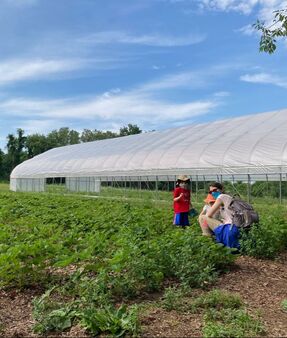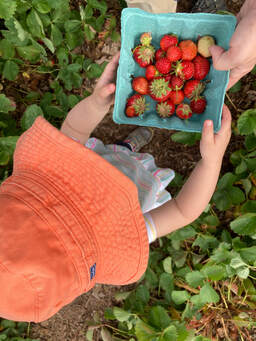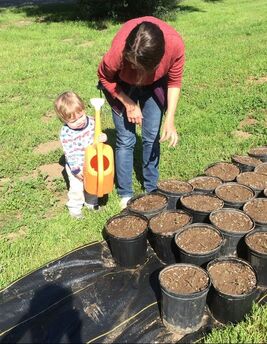About Me
Insect Ecologist and Conservationist
Coordinator of the Massachusetts Pollinator Network, Northeast Organic Farming Assocaition (NOFA/Mass)
Coordinator of the Massachusetts Pollinator Network, Northeast Organic Farming Assocaition (NOFA/Mass)

Rosemary earned her Ph.D. in Environmental Science (Ecology) from the University of Virginia in 2015 under the advisement of Dr. T'ai Roulston. Her doctoral research focused on the influence that flower (i.e. food) availability and parasitism have on bumblebee (Bombus spp.) population dynamics, and how risks associated with these factors vary among species within a community. Integrating field observations, parasite analysis, colony manipulations, the use of radio frequency technology, and simulation modeling, her work investigated these sources of environmental influence independently and interactively through studies that focus on bumblebee populations and environmental risks present in northern Virginia.
Among the bumblebee parasites she has studied is Nosema bombi, a pathogenic fungus that has been implicated in the precipitous and rapid decline of several bumblebee species across North America. During her graduate studies, she became especially interested in the interaction between bumblebees and one of their parasitoids, the conopid fly. Although the basic biology of this interaction has been described, little is currently known about the ecology of this host-parasitoid relationship, particularly in North America. Over three years, Rosemary worked with undergraduate student collaborators to investigate multiple aspects of this host-parasitoid relationship relating to behavioral ecology, population ecology, and even physiology.
Rosemary is a native of Philadelphia, PA. She earned her B.A. in Biology in 2007 from Bryn Mawr College, an all women's liberal arts school in the greater metro area, and worked for two years at the Academy of Natural Sciences of Philadelphia as a lab manager for the in-house Patrick Center for Environmental Research. Here, she worked with a team of scientists dedicated to water quality monitoring. During this time, she also coordinated the museum's NSF-funded Research Experiences for Undergraduates (REU) Program. As a graduate student, Rosemary was involved as a research mentor and workshop facilitator in the REU program hosted by Blandy Experimental Farm, a University of Virginia research station located in the northern Shenandoah Valley of Virginia.
From 2015-2018, Rosemary worked as a postdoctoral researcher in the the lab of Dr. Neal Williams at UC Davis, where she lead a large field experiment designed to understand how seasonal patterns of food availability affect bumblebee colony foraging dynamics, growth, and reproduction. This work was done in conjunction with the lab of Dr. Elizabeth Crone at Tufts University, and Maj Rundlöf of Lund University, and involved a collaboration with the UC Davis Engineering Department. You can read more about the details of this project here. In 2019, Rosemary joined the lab of Dr. Lynn Adler at the UMass Amherst where she worked on a research project aimed at understanding the influence of diet on bumblebee colony development and health (learn more here).
Since 2021, Rosemary has worked with the Northeast Organic Association (Massachusetts Chapter) as the coordinator of their pollinator protection program, the Massachusetts Pollinator Network. In her personal time, she enjoys gardening and exploring nature with her family. She also spends time raising awareness about 22q11.2 Deletion Syndrome: the second most common chromosomal disorder in humans, affecting between 1:2000 and 1:4000 live births annually.
Among the bumblebee parasites she has studied is Nosema bombi, a pathogenic fungus that has been implicated in the precipitous and rapid decline of several bumblebee species across North America. During her graduate studies, she became especially interested in the interaction between bumblebees and one of their parasitoids, the conopid fly. Although the basic biology of this interaction has been described, little is currently known about the ecology of this host-parasitoid relationship, particularly in North America. Over three years, Rosemary worked with undergraduate student collaborators to investigate multiple aspects of this host-parasitoid relationship relating to behavioral ecology, population ecology, and even physiology.
Rosemary is a native of Philadelphia, PA. She earned her B.A. in Biology in 2007 from Bryn Mawr College, an all women's liberal arts school in the greater metro area, and worked for two years at the Academy of Natural Sciences of Philadelphia as a lab manager for the in-house Patrick Center for Environmental Research. Here, she worked with a team of scientists dedicated to water quality monitoring. During this time, she also coordinated the museum's NSF-funded Research Experiences for Undergraduates (REU) Program. As a graduate student, Rosemary was involved as a research mentor and workshop facilitator in the REU program hosted by Blandy Experimental Farm, a University of Virginia research station located in the northern Shenandoah Valley of Virginia.
From 2015-2018, Rosemary worked as a postdoctoral researcher in the the lab of Dr. Neal Williams at UC Davis, where she lead a large field experiment designed to understand how seasonal patterns of food availability affect bumblebee colony foraging dynamics, growth, and reproduction. This work was done in conjunction with the lab of Dr. Elizabeth Crone at Tufts University, and Maj Rundlöf of Lund University, and involved a collaboration with the UC Davis Engineering Department. You can read more about the details of this project here. In 2019, Rosemary joined the lab of Dr. Lynn Adler at the UMass Amherst where she worked on a research project aimed at understanding the influence of diet on bumblebee colony development and health (learn more here).
Since 2021, Rosemary has worked with the Northeast Organic Association (Massachusetts Chapter) as the coordinator of their pollinator protection program, the Massachusetts Pollinator Network. In her personal time, she enjoys gardening and exploring nature with her family. She also spends time raising awareness about 22q11.2 Deletion Syndrome: the second most common chromosomal disorder in humans, affecting between 1:2000 and 1:4000 live births annually.
Publications
* = mentored student |
Curriculum Vitae
Media Coverage
| ||



